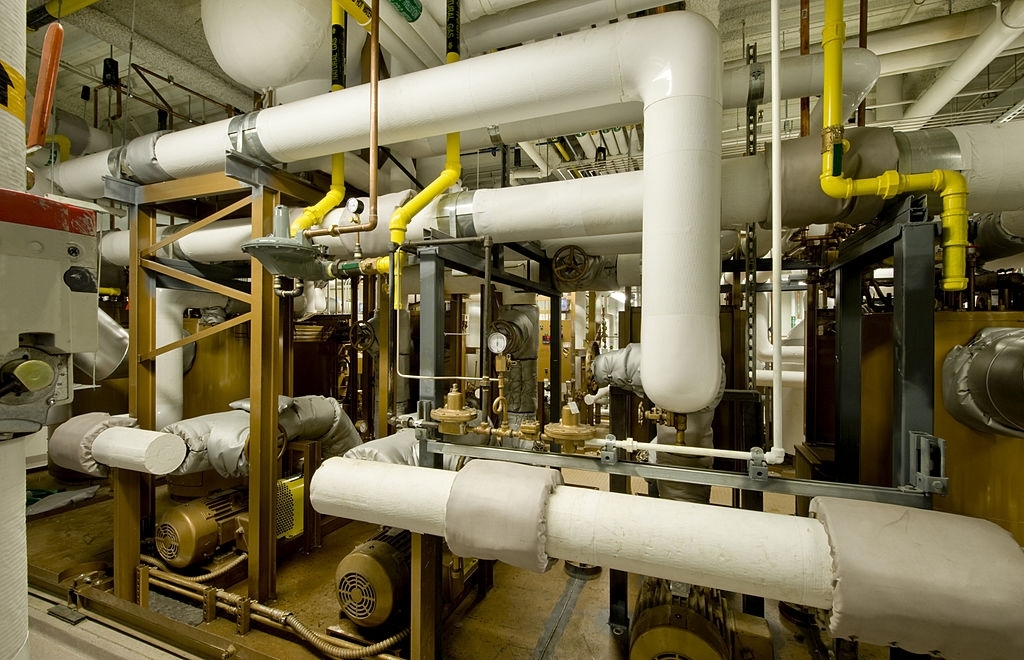Most people don’t consider insulation when developing their energy initiatives or yearly budgets they either don’t install insulation at all or don’t plan on installing it. However there are many benefits of Mechanical Insulation, it is one of the easiest and smartest investments industrial and commercial facilities can make. This guide explores five (5) ways a properly designed and installed insulation system benefits your facility
Condensation Prevention
Every plant and facility struggles with moisture control, too much moisture can cause major problems, and mechanical systems that operate below the ambient air temperature are usually a main source of condensation.
When properly designed, installed, and maintained, mechanical insulation helps control condensation and limit corrosion by keeping surfaces above the highest possible dew point temperature of the ambient air.
Why Condensation Prevention?
When piping and equipment operate at temperatures lower than the ambient air, moisture in the air will condense, or freeze, on or within the insulation surface, or on the cold pipe surface. Unless the system is protected by sufficient mechanical insulation, the moisture can cause serious problems, including, loss of energy & insulation value, second pipe erosion and third unsafe conditions.
Pipe Erosion
Corrosion under insulation (CUI) is a well-known condensation-related challenge in the industry. Pipe corrosion under insulation is a slow but debilitating (and potentially expensive) problem. If the corrosion becomes too severe, the piping will need to be replaced, which will most likely result in shutting down the facility in order to complete the work.
Loss of energy
The thermal efficiency of the insulation system significantly decreases when it’s compromised by moisture. The reduction in the insulation value can eventually lead to a failure of the entire system and the need for repair and—more likely—replacement.
2. Improved Process Control
One of the keys to process control is providing a stable environment. A properly specified and installed insulation system on bare process lines and equipment can increase the efficiency of a process system by as much as 95% or more.
Insulation is particularly effective for maintaining continuous processes like temperature control. When systems exceed their standard operating temperatures, the process—or even the product itself—can suffer. Insulation helps provide predictability and reliability to mechanical systems by lessening the risk of overheating or freezing.
3. Reduced Energy Use
With the ever-increasing emphasis on energy accountability in facilities, reducing energy use continues to be a priority. Luckily, energy savings just might be the biggest and most well-known benefit of mechanical insulation. The right insulation system provides an immediate reduction in energy use and results in significant savings.
How much energy does insulation save?
The amount of energy an individual facility can save with proper insulation depends on many different factors, including:
- The type of insulation that was installed
- How well the insulation system is maintained
- Fluctuations and changes in your average operating condition
4. Personal Protection
One of the most important benefits of insulation is protecting staff and creating a safer work environment. Here are several ways insulation helps to ensure worker safety and contribute to organizational compliance with health and safety regulations.
Protecting from fire
Mechanical insulation is sometimes used as a firestopping material where a pipe passes through a wall. When insulation is specified for firestopping, it essentially prevents the fire’s spread through the annular space between the pipe and the wall.
Limiting exposure to heat
Indoor workers in certain industries are exposed to environments where heat is a problem. Insulation also helps reduce the temperature of a space where mechanical equipment and piping is generating heat.
Reducing the risk of burns
If there is a potential for injury, to be a hazard and issues citations if employees can come into contact with such surfaces. Exposed steam and hot water pipes in employee areas need to be covered with an insulating material to comply with regulations.












